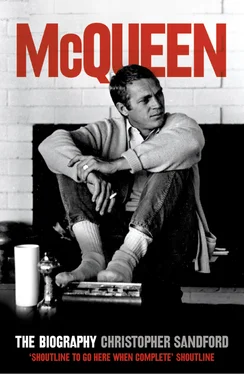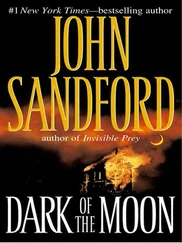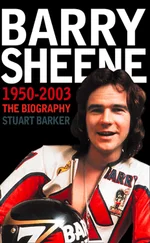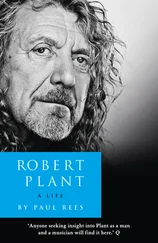McQueen himself looked unhappily through the back window taking in the acrid smell of the city. Those 400 miles were worlds exquisitely separated. Where once there’d been Claude’s pigs, now there were pool halls, the Crescent and the Roxy. Racially, too, Indianapolis was segregated, black and white symbolically split by the railway – somewhere, downtown, men wore cheap Irontex suits and drove boatlike cars past hand-painted signs saying EATS. Local unemployment and, not incidentally, racketeering and Klan activity were all at their height and there was a curfew. It was raining. With two mismatched homes and no fewer than four warring role models (five, including his new stepfather), it’s hardly surprising McQueen would return to the theme of self-reliance throughout his career, channelling it into his best work and telling one startled reporter, ‘I’d rather wake up in the middle of nowhere than in any city on earth.’
The bus pulled in to the Meridian Street depot at midnight. Julian was more than an hour late meeting it, and Steve could smell the gin on her breath when she kissed him. He was introduced to her dour, clinically psychotic, it emerged, husband, and the three of them walked down dark streets, frequently challenged by police, to the boarding house. It was on the site of a former stockyard, and the old stink still haunted the place. Even through the shut window, the familiar depressing reek of meat, tallow, pulverised bones, hair and hides wafted up to Steve’s cold room. Towards dawn, he could hear Julian’s voice pleading and begging through the wall, and then the sound of her husband punching her. Finally, with daylight, the boy fell asleep. After all, he later told a close friend, it wasn’t as if it were permanent. They already owed their landlord ten dollars.
Before long Steve’s fourth-grade teacher in Indianapolis wanted nothing to do with him, and the contempt was mutual. Most mornings he went back to his earliest haunts, nowadays alone, slipping into the darkness of the Roxy, then begging some bones at the kitchen door of a diner. It wasn’t unknown for him to scavenge from the dustbins outside the canal bars, and he became an underage, lifelong beer toper. One day Steve fell in with some older boys who showed him how to steal hubcaps and then redeem them for cash at a store downtown. It was his first glimpse beyond his own rebellion into a world of organised crime that he would find more intriguing than the weekly mass to which his grandmother had dragged him in Slater. Julian and her husband tried, too, packing him off to a delinquents’ summer camp and Sunday school. But Steve acquired neither religion nor social graces. Soon, he was spending his nights running with a gang. He rarely, if ever, slept at home.
There was some building done during the late 1930s and early 1940s: hospitals, museums and parks all overlaying the great Lockefield Garden prank, a slum clearance scheme that provided housing for 7000 families. Several of these projects went broke and the Reconstruction Finance Corporation had to bail them out. By the time Steve arrived for the second time, the feds had assumed much of the local relief burden and a bewildering raft of agencies funnelled funds to help towns like Indianapolis to their own grass-roots ‘solutions’. Soon enough, there was money and food available to the needy. The young McQueen doted on the pleasure it would bring to relieve the suits of their cash.
Steve not only legitimately applied for ration tickets. He began working a lucrative forgery scam with his street mob. Between them they printed bundles of the tatty coupons and sold them at a profit to their contact downtown, who was in turn reimbursed by Washington. It was a crude but highly effective form of pioneering welfare fraud. Steve might have been a flop at school, but his inner fire – the vitality that erupted whenever he got away with something – was uncanny for a so-called loser. From about 1940 onwards he was busy either as a petty hood or generally twisting the system – and people’s melons – to his own ends. ‘You had this sense he was getting back on folks,’ says Toni Gahl. ‘He just tried everything, like he was fighting for his life. I heard about his [welfare] thing. Son of a bitch! No one else was doing that then, I couldn’t believe it.’
There was something almost confidence-inspiring in McQueen’s later career. For the few who knew him and millions who didn’t, his was the big magic that offset the cliches of the American film industry. Partly this was a result of his image, partly the result of his personality. Even in the 1940s a gap opened up between the angry thug and the shy boy wearing a pair of overalls hand-labelled Huck who was quiet, kind and fanatically loyal to friends. One was dark, one was sunny, but the two McQueens had this in common: both were warped by a sense of being alone in a ‘shit’ world. That long and hard childhood made him a master at walking a thin tightrope, buffeted by the warring rivalries of Julian, her husband and Slater, with church, school and his criminal interests to consider as well. It was a neat balancing act.
When her man left, as they all did, Julian made it a point of honour not to resort further to food stamps. Prostitution only ever supplemented her typing and waitressing but, after the day Steve caught her in flagrante , it took on a symbolic importance for him far outweighing its fiscal value. She hated doing it, obviously. No she didn’t. She didn’t hate it all that much. She was always fucking at it, he told Gahl. Sailors. Suits. Anyone, any time at all. From then on Steve spent his few evenings at home sitting on the stoop of their small downtown hotel while Julian was at work upstairs. She’d yell at him and throw a shoe at the door if he ever interrupted her, and he even had to fit his sleeping arrangements (by now he and his mother were sharing a bed) around hers. If Julian was entertaining late, Steve would make up a sort of bunk for himself, using his jacket and a few flattened boxes as blankets, on the ugly, geometric-patterned tile floor of the vestibule. One winter when she was unusually busy, he ate all his meals out there, crouching behind stairs or walls, or anywhere that was protected from the snow.
Indianapolis aged him, but arguably he never really grew up. Steve’s family life was dire and, at times, outrageous. On Saturday mornings, after a week in which she’d been with four or five men, Julian would shout downstairs and ask him the time. The ritual gave Steve a rare link back to Slater, since his one valuable possession was a pocket watch he’d been given by Claude. He’d yell up in his high, reedy voice, breaking slightly but also militant, ‘Nine o’clock, Ma.’ This was the signal for one of those sudden reversals in behaviour that constituted the basic pattern of Julian’s life. She’d come down in her high heels and dress, kiss him on the mouth and then hurry off with him to the Roxy. Steve already lived for the cinema. Even in the drenching rain which seeped through the brickwork, he could soak up the lushness and grace of the western landscapes he loved, the grandeur and ruggedness, the seductive combination of sex and violence. By his eleventh birthday, he was hooked.
It was a boom time for the movies. In the early war years Hollywood went from a half-shod outpost dealing in flickers to a culture factory employing the likes of Mann, Brecht and Faulkner. A large number of Broadway’s classical stars were coming west as fast as they could make it. The very best pictures of the day – Gone with the Wind, The Grapes of Wrath, Mrs Miniver – created characters that weren’t just some new aspect of stage acting, but new from the ground up. Bogart’s High Sierra , above all, won Steve over. This far-fetched gangster yarn had its faults, even he would admit, but in the lonely, sardonic yet soulful leading man it boasted a recognisable role model – ‘someone [whose] mud I dug’. More than thirty years later he was still mining the lode of that film, along with trace elements of The Maltese Falcon and Casablanca. ‘I first saw Bogie on screen when I was a kid,’ Steve said in 1972. ‘He nailed me pronto, and I’ve admired him ever since. He was the master and always will be.’
Читать дальше












